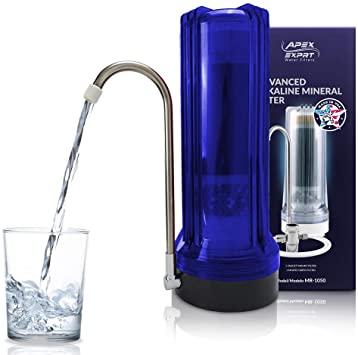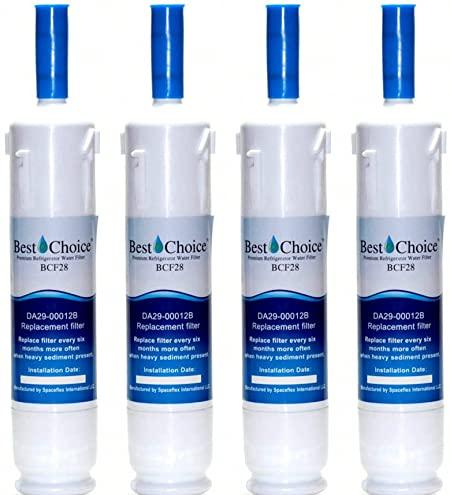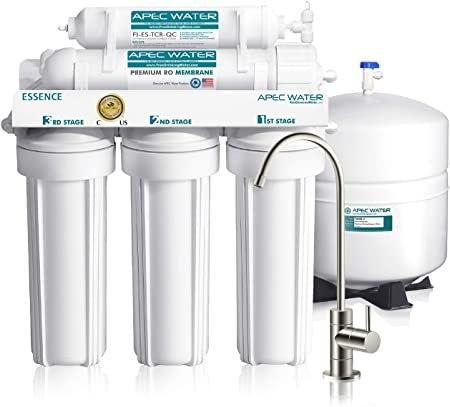While about 71 percent of Earth’s surface is covered with water, only about 3 percent of this water is usable in domestic households.
Although the water coming to your home from the city is treated, a lot can happen between the treatment plant and the faucets in your house.
Most water treatment plants use chemical purifiers like chlorine, which can leave your water with an unpleasant odor. The presence of iron in the water can give it a metallic taste. To rectify all these issues, you need the best water filter on the market.
Reasons To Filter Your Water
The following are just a few reasons why water filtration is necessary.

Improving the Taste of Water
Some contaminants in the water, like rust and excess chlorine, make the taste pretty unpleasant. Eliminating these contaminants can improve the taste of your water.
Heavy Metal Contaminants Like Arsenic
If the source of your water is a well in an urban area, or if your home water supply comes from groundwater, you might have arsenic in your water, among other heavy metals. Arsenic is associated with several health problems, and most notably, arsenic can cause cancer.
If you have arsenic in your home water supply, you will need a point of entry (POE) water filter. This way, all the water coming into your home will be filtered.
Government Treatment Plants are Not Very Vigilant
While the authorities in your city will treat the public water supply before releasing it into people’s homes, they are not very vigilant on water purification. If you want to rest easy knowing that you and your family have a supply of clean drinking water, you will have to bridge that gap yourself.
Going Out in the Wilderness
If you are planning an outdoor excursion with friends or family, you will need a water filter to survive in the wild, especially if you will be staying for a few days or more. Staying hydrated is always important when outdoors. However, drinking unsafe water can cause diarrhea, which leads to further dehydration, making the situation even worse.
Water from streams might contain sediment, debris, and pathogens. Make sure you bring a filter that can eliminate these contaminants.
If you find yourself without a filter in the wild, boiling water is always a sure way of disinfecting it.
How to Choose the Best Water Filter
While every home needs a water filter, deciding which filter to choose is not an easy task. This series of steps will help you determine the kind of water filter that’s most suitable for your needs.
Find Out What is Contaminating Your Water
To know whether or not you need a water filter, you will need to find out if your water is contaminated in the first place. There would be no point in filtering water that has no contaminants in it. Therefore, the first step in deciding on the kind of filter you need is finding out if your water is contaminated and which specific contaminants are in the water.
To do this, you will need to bring a sample of your water to a certified laboratory. This way, you will know for sure if your water is contaminated and with what.
Decide on Point of Entry or Point of Use
Once you get your water tested, then you can easily tell whether you need a POE (point of entry) water filter or a POU (point of use) filter.
If the water coming to your home is highly contaminated, you might want to get a POE filter. This way, every drop of water coming to your home from the main supply line passes through the filter and is purified.
On the other hand, if the water from the main supply is safe for most tasks, like washing utensils and showering, you might only want to purify water for cooking and drinking. In this case, a POU water filter at the main sink or a carafe design water filter will do just fine.
Decide on a Filtration Method
There are different types of water filters available on the market, depending on the types of contaminants you want to remove from your water.
If your water is just hard, for instance, a water softener or an ion exchange water filtration will work fone. If, on the other hand, your water has high levels of fluorides, you will need to get the best fluoride filter on the market.
Factors to Consider When Buying a Water Filter
Following the guidelines above will help you figure out what kind of water filter you need to look for, but you also want to make sure you get the best water filter on the market for you and your family’s needs. It is not an easy choice, seeing that there are numerous water filters available. Here are some factors to consider in order to get the best value for your money.
Filter Certification
This is one of the most important factors to consider when looking for a water filtration system for your home. Anyone can claim to have developed a functional water filter that filters out everything harmful. If this is not verified by an independent certifying body, however, there is no way to really tell.
If you are buying a water filtration system in the US, for instance, you might want to check whether it’s NSF (National Sanitation Foundation) or ANSI (American National Standards Institute) certified.
Filter Durability
When you are buying a water filtration system, you want to make sure you get one that will serve you and your family for a long time to come. Water filtration systems can be expensive, so making sure to get one with a sturdy construction will guarantee you an extended lifespan.
Most importantly, if the filtration system is to remain effective, you will have to keep replacing the filter. The longer the filter can last before you need to replace it, the better.
Your Family’s Water Needs
If all you need to filter in your house is the drinking water, keep your family size in mind. If you are a large family that needs several gallons of drinking water daily, a carafe kind of water filter may not be sufficient. You might want to get a faucet attachment filter instead.
Filter Maintenance
Most water filters will need proper maintenance if they are to remain effective. Poorly maintained water filters are as good as not having a filter at all.

With some filters, you will also need to change them periodically. Make sure you are keeping track of how often you should replace the filter. To help you remember, note the date somewhere for future reference.
Permanent Filter or Pitcher Filter
If you are shopping for a point of use water filter, you can either get a permanent one or a pitcher. A permanent water filter will be attached to your sink, so that every time you turn on the faucet, you will be getting filtered water.
A pitcher filter, on the other hand, is a countertop water filter that you refill on your own for when you need it. These kinds of water filters can also act as tabletop water dispensers.
One of the major drawbacks to pitcher filters is that they take longer to filter water. You also have to keep refilling the filter, and if you forget, there will be no filtered water when you need some.
Filter Price
Although you shouldn’t compromise on quality for a lower price, price is an important thing to consider. Whatever your budget for a water filter, if you keep all the above considerations in mind as well, you will be sure to find a suitable one for the price you need.
Filtration Method
The reason why finding out what’s contaminating your water should be the first step to getting a water filtration system for your home, is because different types of filters will use different filtration methods. Different filtration methods will get rid of different contaminants, in turn.
When you know what you want to filter from the water, you can choose appropriately. To help you make the right choice, the following are the most common water filtration methods and what contaminants they get rid of.
Mechanical filtration
Mechanical water filtration will mostly get rid of solid particles from the water, like debris, soil, and rust. If the contaminants you want to eliminate from the water are solid, a good sediment filter is what you should get.
Mechanical filters are also used in conjunction with other kinds of filtration systems, like reverse osmosis (RO), to get rid of solid contaminants before the water is passed through the RO membrane.
Reverse osmosis (RO)
Reverse osmosis water filters are some of the most common filters you will currently find on the market. Their popularity can be credited to their ability to remove most water contaminants, resulting in safe, clean drinking water.
Reverse osmosis will clean water of heavy metals, salts, pathogens like bacteria and viruses, arsenic, and many other elements. The water filtered by this method tastes great and is largely free of unnecessary elements. If you are having a case of salty water in your home, an RO filter is one of the best saltwater filters you can get on the market.
UV filtration
The UV filtration system uses the UV light spectrum to attack and destroy bacteria and viruses contaminating your water. If bacteria and viruses are the main contaminants in your water, get yourself the best UV water filter on the market.

Keep in mind that UV filters only filter out bio-contaminants. If you have other contaminants in your water, like harmful metals, they will still be present on the other side of the filter.
Ion exchange
This filtration method is most suitable if you are looking to get rid of hardeners in the water. The ion exchange system works by splitting compounds responsible for water hardness. Water going through the ion exchange tank is stripped of calcium and magnesium, which are the main culprits causing hardness in water. Sodium takes their place instead.
While this method softens the water, to make your water perfectly drinkable you will likely need a second method of filtration. This is why ion exchange filtration systems are mostly used as a precursor to other filtration methods, like reverse osmosis.
Activated carbon filtration
Activated carbon filters are another popular filter choice on the market. These filters work by using activated carbon to trap impurities from the water flowing through them. Any particle with a larger diameter than the diameter of the pores of the filter are left on the filter’s surface, while clean water passes through.
Carbon filters remove chlorine, organic farm chemicals, and any industrial solvents in the water. If you are looking to remove hardeners from your water, however, activated carbon filters may not be the ones to buy, as they do not remove minerals.
What to Look For in the Best Survival Water Filter
What we’ve mentioned so far are good things to look out for when you’re shopping for your water purification needs at home. But what if you were looking for a survival water filter?
Think About Portability and Weight
When you are stuck in a sticky situation, and you are fighting for survival, you don’t want to be dragging around a lot of weight in the form of a water filter. Keep in mind that you will also need to carry other things, like food, and everything needs to be as light as possible.
This is why a survival water filter should be relatively light in weight.
How Many People are You Likely to Be With?
If you are in the wild with several people, you want to make sure you have a water filter that can cater to everyone’s water-drinking needs. When you are buying a survival water filter, make sure you get a water filter with the right capacity.
What Is Your Most Likely Water Source?
If disaster strikes when you are in a city setting, you will need a filter with intense purification capabilities, as the water in urban settings can be heavily polluted by harmful chemical contaminants. If you are in a country setting, the water in streams will likely be cleaner, and a simple purifier will do.
Best Refrigerator Water Filters
Now you know what to look for when shopping for a survival water filter or a general household filter, but did you know that if you have a fridge with an ice maker or a dispenser, you will need to get a filter for that too?
Fridge Filter Certification
Just like when shopping for a general home filter, you should look for certification from a reliable certifying body like the NSF if you are in the US. This is because there are a lot of manufacturers offering these kinds of filters, and without proper testing and certification, there is no way to know if a filter works as advertised.
Fridge Filter Longevity
Usually, you can get about six months of quality service from a refrigerator filter before you have to replace it with a new one. A fridge water filter that doesn’t last as long is not good value for the money.
Other Types of Filtration Systems
Aside from the many water filters we have already mentioned, here are some other types of filters you will find on the market.
Ceramic Water Filters
Ceramic water filters are made of a ceramic cartridge. The most common models are basic ones with a ceramic filter inside and a plastic exterior container to collect the filtered water.
The plastic exterior will have a valve and acts as a countertop water dispenser. The filter works by using a porous ceramic cartridge with 0.5-micron pores. Any sediment or contaminants with a wider diameter than that will be filtered out as the water goes through the filter.
The best ceramic water filter will remove any solid particles in the water, as well as disease-causing bacteria. Ceramic water filters cannot remove viruses from water, nor will they remove chemical contaminants like chlorine or volatile organic compounds (VOC).
Ceramic water filters can, however, be combined with other filters like activated charcoal to take out more contaminants from the water. A ceramic filter combined with activated charcoal will also filter out chlorine-based contaminants.
According to the CDC, ceramic filters have been proven to produce clean drinking water and prevent many waterborne diseases.
Bottle Top Filtration
Bottle top filtration systems are mostly sold in kits and are used in labs. This water filtration system uses a single-use bottle top filter and vacuum suction to create a sterile and quick-working filtrate.
Bottle top filtration systems are not only used to filter water, but can be used with other solutions that need filtering in a lab as well. They mostly remove solid contaminants.
Homemade Water Filters
Every human being needs clean water for survival. While this is a fact, a considerable percentage of people in the world cannot afford a water filter for their drinking water. You can, however, make yourself a simple homemade water filter like this one if necessary, which uses simple scientific concepts on a smaller scale.
With it, you will have access to clean water. Remember, however, that even the best homemade water filters will not purify your water fully, but mostly just filter it. After you have filtered the water, you will need to sterilize it by boiling to make it drinkable.
Frequently Asked Questions about Water Filters
Can Water Filters Filter Out Bacteria?
Yes, water filters will filter out harmful bacteria from your water, but this largely depends on what kind of filter you get. Some mechanical filters are only designed to get rid of solid contaminants, while reverse osmosis filters, UV filters, and other types will successfully filter out bacteria.
Before you buy a filter, make sure to find out what kinds of contaminants it can filter out. Compare your tester water sample and see whether all the contaminants you need taken care of are included.
How Often Should I Change My Water Filter?
All the filters on the market have a recommended time limit on usage, after which you need to replace your filter. When you install the filter, note down when you should change the filter next, so you can refer to it in case you forget.
There are also physical signs that it’s time to change a filter. If you notice that there is a decreased water flow, you probably need to change the filter. A change in the taste or the odor of the water is also a good indication you should change the filter.
Don’t wait until you notice physical changes, however, as this will mean you are already using contaminated water.
Conclusion
Gone are the days when water sources were free of contaminants, and you could drink from streams and be just fine. Now there are so many potential contaminants in the water coming to your home, and sometimes the regulating bodies simply do not do enough to ensure your safety.
This is why you need a water filter. If you want to rest easy knowing that your family has access to safe drinking water, you need to find the best water filter for your unique needs.
Choosing the best one on the market is not an easy task, as there are so many variables to consider. We hope this guide helped shed some light on the water filter buying process. Good luck!
